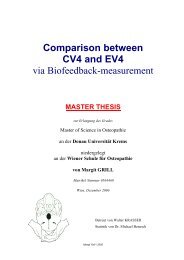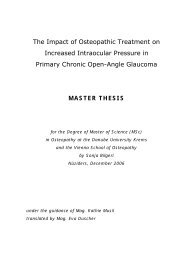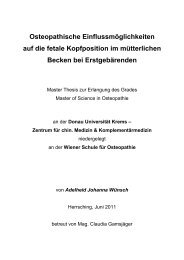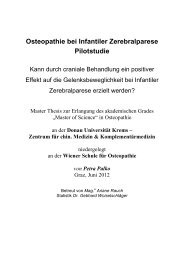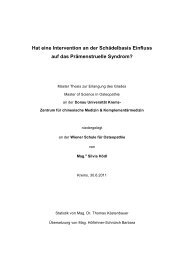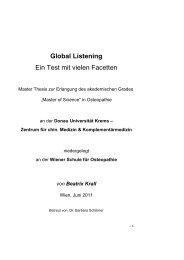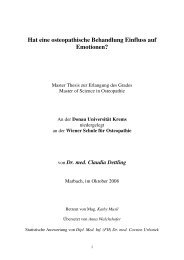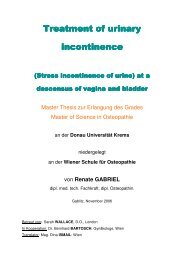Risch Andreas.pdf - Osteopathic Research
Risch Andreas.pdf - Osteopathic Research
Risch Andreas.pdf - Osteopathic Research
Erfolgreiche ePaper selbst erstellen
Machen Sie aus Ihren PDF Publikationen ein blätterbares Flipbook mit unserer einzigartigen Google optimierten e-Paper Software.
about the osteopathic view on health and disease. For him it’s important to define<br />
health in it’s relationship to disease distinguishing at the same time between disease<br />
and illness. He also stresses the issue if osteopaths look at health from an ethical<br />
point of view (life-death) or a biological one (wellbeing-suffering) and where is the<br />
difference between osteopathy and allopathic medicine. In the newer osteopathic<br />
literature the issue of how osteopaths make their personal and professional<br />
experience and how it can be evaluated is discussed.<br />
However, difficulties in understanding the underlying processes of what the concepts<br />
of osteopathy consist of still remain. Therefore by examining osteopathic language<br />
especially by analyzing it’s metaphoric concepts about health can help to gain a<br />
better understanding of the philosophical, scientific and professional concepts of<br />
osteopathy related to thought, communication and practice in a contemporary, sociocultural<br />
context.<br />
4 Metaphor and modern metaphor theories<br />
The word metaphor derives from old Greek language and means literally “to carry<br />
over” or “to transfer”. A metaphor “is projecting or mapping” a certain understanding<br />
or experience from a “source domain” on to a “target domain” and provides meaning<br />
and explanation, e.g. “Truth is like Fire”, “Speaking the truth is shining and burning”.<br />
Although the metaphor was considered for long time in history somewhat tricky and<br />
treacherous and primarily decorative it received a complete new meaning in the 20 th<br />
century with the progressive research in cognitive linguistics. Richards and Black<br />
attributed the metaphor for the first time a cognitive quality in their theory of<br />
interaction believing that the interaction of words is a creative process and help the<br />
emergence of meaning.<br />
With the publication of their book “Metaphors we live by” G. Lakoff and M. Johnson<br />
(1980) set a milestone for metaphor research in philosophy, psychology and<br />
cognitive linguistics.





